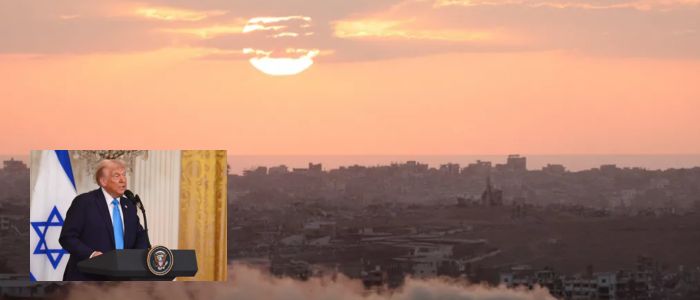This week, Canada announced it will follow in the footsteps of France and the UK by officially recognizing a Palestinian state later this year, but only under certain circumstances, marking a shift in diplomatic posture.
The US, however, has continued to side with Israel under the administration of Trump, dismissing as anti-Israel the efforts.
This widening diplomatic divide was underscored at a conference in New York led by France and Saudi Arabia, at which European and Arab countries urged greater international backing for the creation of a Palestinian state.
Although there were US allies there, the Trump administration boycotted the event. A US State Department spokeswoman described the meeting as a "publicity stunt," saying the US believes direct discussions can lead to peace and a halt in the fighting.
But concerns still linger about what the long-term strategy of the Trump administration is for Gaza, as violence and humanitarian conditions have continued to deteriorate.
US No Plan Allies Pressing Ahead
In November 2023, then US Secretary of State Anthony Blinken defined in Tokyo how he thought the future complexion of Gaza should look following the war.
He stressed points including no forced relocation of Palestinians, no re-occupation of Gaza by Israel, and a government of the Palestinians, led by the Palestinians and supported by the Palestinian Authority, with no Hamas in the mix. Israel opposed many of these points, but the framework was crafted to put the US squarely in line with its European and Arab partners.
And yet, the Trump administration raced away from these "Tokyo Principles." The administration offered few details when asked recently about the US plan for the governance of Gaza.
A spokesman said that regional allies were working on "new concepts" requested by the president but would not elaborate. The uncertainty underscores what many view as a strategic void over Gaza's future.
And earlier this year, President Trump offered a controversial notion: Turn Gaza into a "riviera of the Middle East," a plan that implied the expulsion of Palestinians from Gaza. The concept was met with fierce objections, including from Arab states such as Saudi Arabia.
The plan was later presented by the US as a voluntary emigration programme, deemed unworkable and in potential violation of international law by most accounts. The idea has been let slip quietly.
In a meeting with Israeli Prime Minister Benjamin Netanyahu earlier this month, Trump also sidestepped specifics on a plan to let Palestine know and put faith in Netanyahu.
This helps to underline perceptions that US policy on Gaza is moving closer to America's way of doing things.
Deepening Conditions Raise World Alarm" Israeli forces now hold roughly two-thirds of Gaza.
Prime Minister Netanyahu has refused any role for the Palestinian Authority in running the territory, while a corner of his coalition has called openly for permanently maintaining control by military force and increasing the Jewish settlements.
Israel, meanwhile, has been accused of using food supply control as a weapon, of creating militarized zones, and of arming rival Palestinian militias. The Integrated Food Security Phase Classification (IPC) has documented worsening indicators of hunger, disease, and malnutrition in Gaza.
Israel still blames both Hamas and international organizations for the crisis, even as it says it is allowing in more aid.
The mounting humanitarian crisis has also prompted European leaders to respond strongly. "The shocking news that children have been killed while reaching out for assistance has not only filled me with disbelief but also with anger," The UK's Foreign Secretary David Lammy said.
The starvation crisis is a turning point for many European nations, forcing them to act diplomatically under circumstances they have long avoided.
The recent move by Canada, France, and the UK to recognise a Palestinian state represents a breach of the policy of waiting for a negotiated peace settlement before doing so. Saudi Arabia also added its voice to the demand to disarm Hamas, as Arab and European voices joined together to press for a two-state solution.
Indeed, as the Trump administration keeps sending weapons to Israel with no conditions for change, the lack of a credible US-led peace process is obvious. Now it's US allies, backed by Gulf states, that are stepping in to advocate for a sustainable future for Gaza.
Their initiatives involve calling for immediate humanitarian support, bolstering the Palestinian Authority, and reviving the conversation about a two-state solution – even if the US is no longer in the room.
Hopeful of reviving international diplomacy, the countries plan to have their next conference in September. But in the absence of US involvement, it's still unclear what direction things are headed.
World

US Allies Push Palestinian Recognition, Leaving Trump Isolated

The United States is increasingly distancing itself from its closest allies over the future of Gaza and the broader Israeli-Palestinian question.















